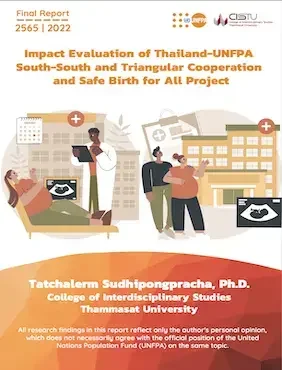The burden of maternal morbidity and mortality is borne not only by mothers and their children, but also by their respective families and communities. Expanding reproductive, maternal, newborn, and child health (RMNCH) services—particularly antenatal care and skilled childbirth services—is an important strategy to achieve the United Nations Population Fund’s (UNFPA) transformative goals and the Sustainable Development Goals (SGDs). This report presents an analysis of the social returns of two South-South and Triangular Cooperation (SS/TC) projects by the United Nations Population Fund (UNFPA) Thailand Country Office and its partner government agencies from Thailand and Lao PDR: the “Safe Birth for All” and “Midwifery Capacity Development” projects. All the stakeholders were consulted to understand all the possible impacts (or changes) due to the projects. These outcomes were given a financial value based on the value of the benefits or costs saved through a reduction of negative and undesirable outcomes for the stakeholders. When the financial costs were not applicable, proxies were used to measure the value, informed by research and stakeholder consultation. This method ensures that all the important outcomes were measured and included in the project impact assessment. Measurable indicators were developed to assess whether the change has happened, how much of the change could be accounted for by each project, and how long the impact lasts.
Based on the social return on investment (SROI) analysis, the “Safe Birth for All” project resulted in 2,100 pregnant women receiving early antenatal care in their first trimester and 4,100 at-risk pregnant women and their families receiving COVID-19 antigen tests. In the target areas, 2,230 adolescent mothers (6.30 percent) gained access to family planning and long-acting reversible contraceptives (LARC), and 30,000 teens could access the virtual health self-assessment platform supported by the project. The “Midwifery Capacity Development” project provided opportunities for 52 participants (42 midwifery educators and 10 midwifery education administrators) from Lao PDR to attend training courses at Khon Kaen University. Upon project completion, 93 percent of the participants had higher self-confidence about their profession. The project also led to a 63-percent increase in the project participants’ capacity to contribute to their organizations, a 29-percent increase in employability prospects for the project participants, and a 24-percent increase in the project participants’ capacity to contribute to their communities.
Further, this study identified that 6,235 midwives between 2016 and 2022 across Lao PDR received training from the midwifery educators who participated in this project. As a result, 43,780 women of reproductive age (e.g., pregnant women, adolescent girls, young mothers) could gain access to improved RMNCH services.
Further, the SROI analysis demonstrated that investment in SS/TC projects on RMNCH generated high social returns. For the “Safe Birth for All” project, every one dollar in investment led to US$ 35.93 of social value. Also, every one dollar that was invested in the “Midwifery Capacity Development” project for Lao midwifery educators and midwifery education administrators created US$ 13.03 of social value. Based on a systematic review of SROI studies by Banke-Thomas et al. (2015), the range of SROIs found from RMNCH programs were between 1.73 and 21.20. The SROI ratio from the “Safe Birth for All” project was higher than this range, while the “Midwifery Capacity Development” project generated SROI that fell within this range.


